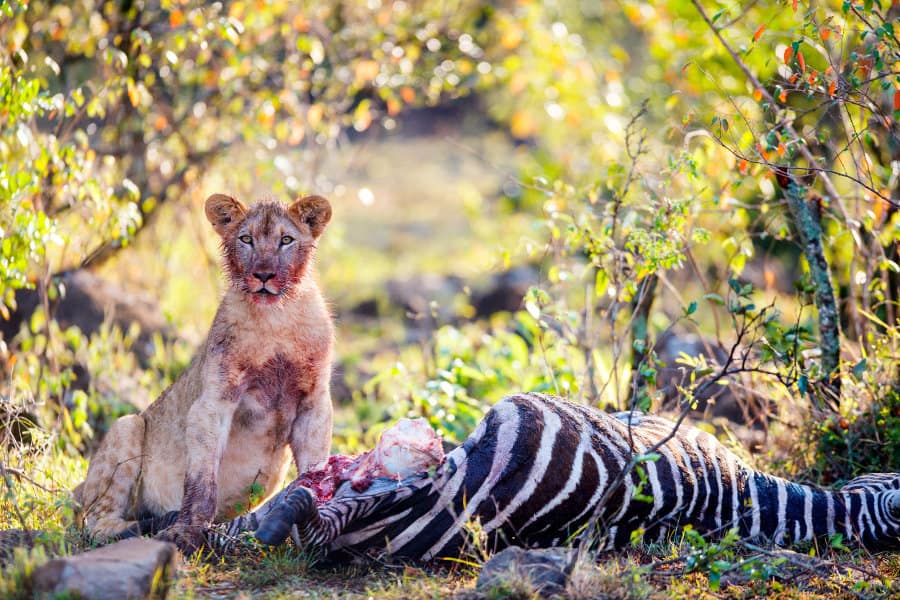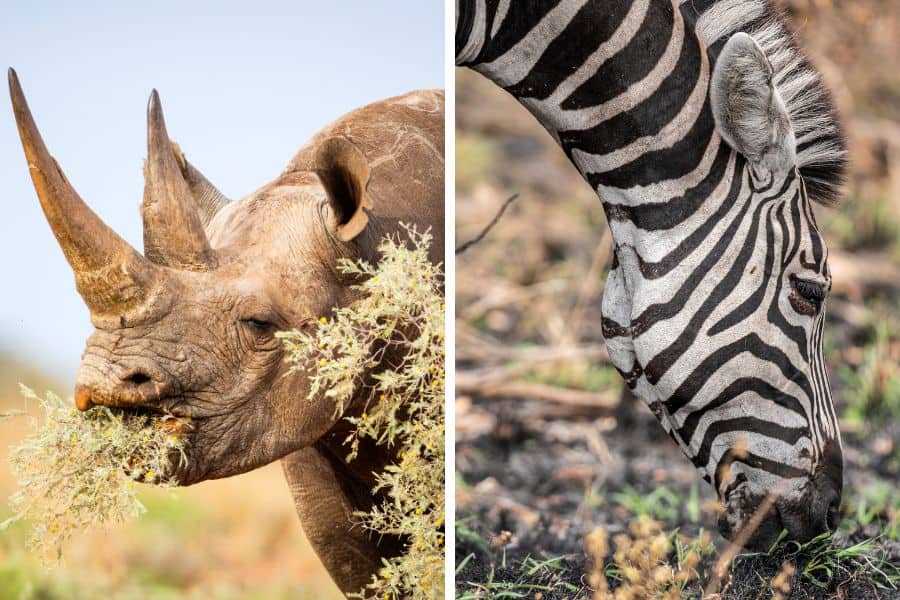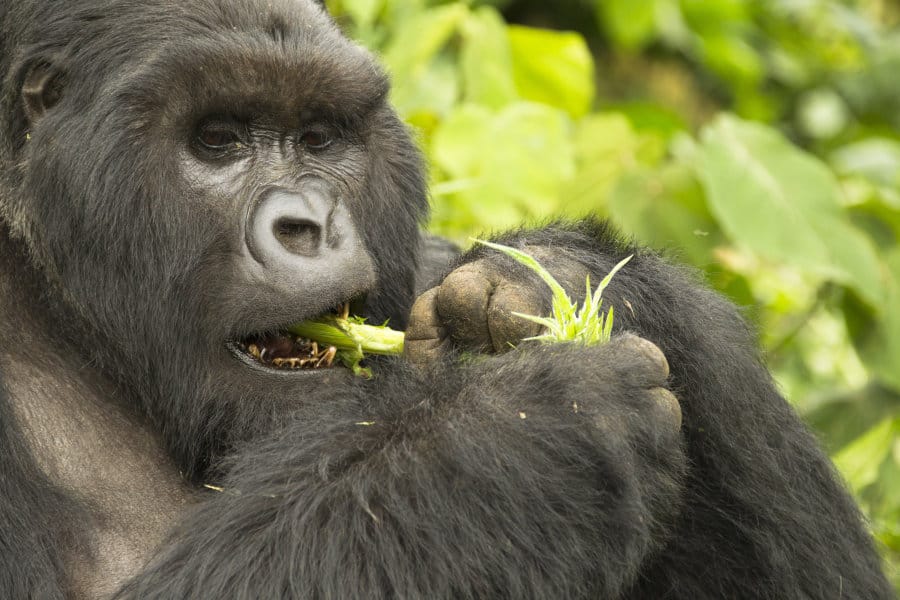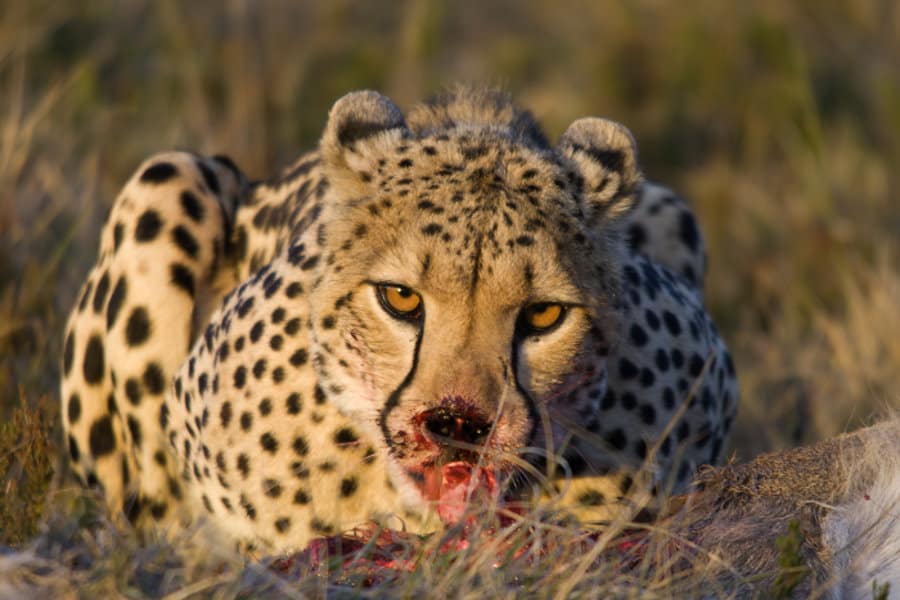Here’s the easy answer to “what do lions eat?”. Lions are carnivores and predominantly eat meat and flesh.
They will eat any prey they can catch, including poachers, as well as animals more than ten times their weight.
Lions are the apex predator out on Africa’s savanna but different lions eat different meats.
Serengeti and Ngorongoro Crater lions mostly eat zebra, a very abundant prey in the area.
Lions in the Okavango Delta have a tendency to enjoy Cape buffalo.
So while it’s obvious that lions eat meat, there are many wonderful complexities to discover about this large cat’s diet.
What do lions eat and drink? Do they eat vegetation as well? How often do they eat? And why do those in different places have such distinct hunting tactics?
Read on to learn more about Africa’s apex predator.
Lions Are Carnivores So What Does a Lion Eat?
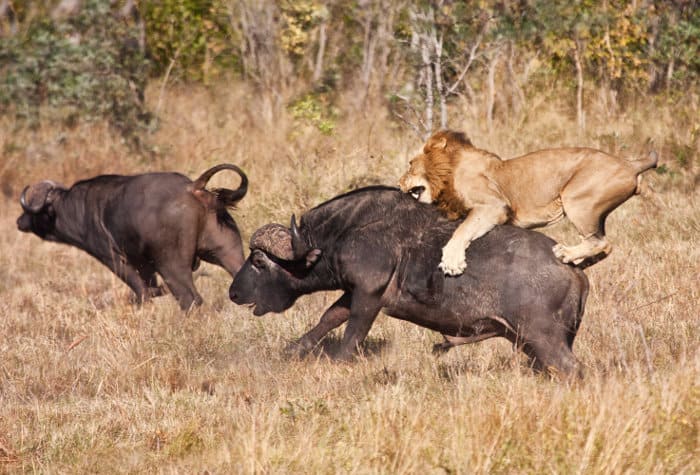
It would be strange to encounter a black-maned lion chomping on elephant grass. Or a lioness laying in a tree eating some fresh figs. It’s strange because lions are carnivores.
More than that, lions are known as obligate carnivores because flesh and meat make up more than 75% of a lion’s diet. Many lions only eat meat – they’re practically the opposite of vegans.
Other African predators have a more varied diet. Consuming both plants and animals, they are known as facultative carnivores.
For example, the bat-eared fox is one of Africa’s most successful predators, as it catches a meal with 70% of its attempted hunts. However, this precise hunter eats everything from beetle larvae to eggs and fruit as well.
Lions are far from Africa’s most successful hunter – that tag goes to humans with guns. In fact, lions have a relatively low hunting success rate.
However, they are the apex predator because they are at the top of the food chain. Lions can hunt almost any prey, but no predators can hunt lions.
Why do lions mostly eat meat?
If you were an apex predator, it would make sense to eat big meals rather than scrapping for fruit or having to queue at the supermarket.
Lions evolved into apex predators because their bodily systems forced them to eat meat and flesh.
Lions cannot survive without meat. Switch a captive lion onto a vegetarian diet, and it will die.
Why?
Every mammal needs amino acids for its own survival. It’s easy for us as our human bodies naturally produce these amino acids. Lions can’t produce them.
So in order to survive, they must take specific nutrients from the meat and flesh of other mammals.
Rather than amino acids, lions produce specific enzymes that help them break down large quantities of meat and flesh.
Our digestive systems also have these enzymes, so we can eat meat as well. However, we can’t consume 15% of our own body weight in meat in a single meal!
Some pastoralist African tribes, like the Masai, traditionally only eat meat as well. It sounds incredible, but it’s true.
They raise cattle and survive exclusively on what their cattle provide – meat, milk, and blood. Just imagine how strong their digestion is!
Do lions eat vegetables?
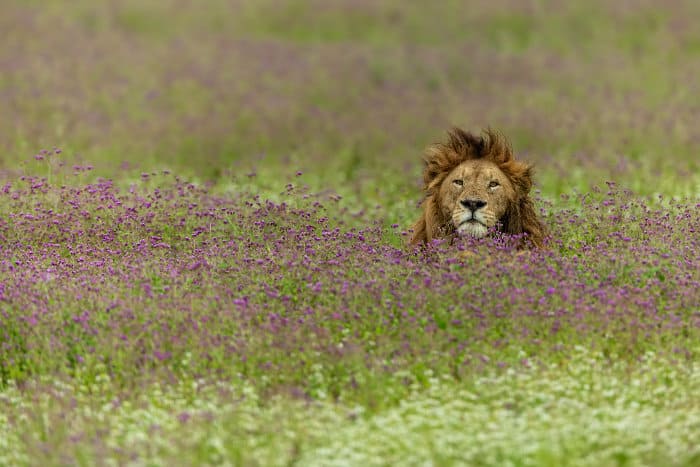
When wondering ‘what do lions eat’, you will not think of anything green. In an ideal world, lions will only eat meat and flesh.
But times can be hard on the African savanna, especially during the long dry season. Drought wipes out both prey and predator.
Young male lions are often on the verge of starvation, even on the most ungulate-rich landscapes. They don’t have the skills to hunt efficiently when times are scarce.
So if you are wondering, “can lions eat vegetables?”, the answer is yes.
At some times during their life, lions also eat vegetation. Consuming out of desperation, they will chew on grass, acidic fruit, and anything that looks palatable.
Do lions eat plants?
Do lions eat grass and green plants?
Unfortunately, lions do not have the correct enzymes to process green vegetation and plants. So like a pet dog eating too much grass, the end result is usually a tiny bit of nutrition and a lot of vomit.
Thus the answer to “do lions eat fruit and vegetables and other plants?” is that lions cannot take much from vegetation. If you see a lion eating grass or fruit, it will usually be saving off the feeling of starvation.
What do lions drink?

Lions drink water. A few online sources will claim a lion drinks a gallon a day, or around three to four liters. That may be true of captive lions, but the story is very different in the wild.
Out in the wild, lions drink when they are thirsty – simple as that!
They can go up to five days without drinking anything. Instead of water, they can obtain all the moisture they need from the stomach and other organs found inside their prey.
Note that this is similar to animals like African springbok and gerenuk. They take all their moisture from plants, so they can venture further from waterholes.
How much a lion drinks will depend on the season and their day’s tasks. Lions are lazy cats and can spend up to 20 hours a day doing nothing but rest and sleep. This is especially true for the 24 hours after a big meal.
At such times lions don’t need much water. But when it’s the heart of the dry season, and they’ve been hunting unsuccessfully throughout the night, lions need a lot more than one gallon of water to keep going.
How much does a lion eat a day?
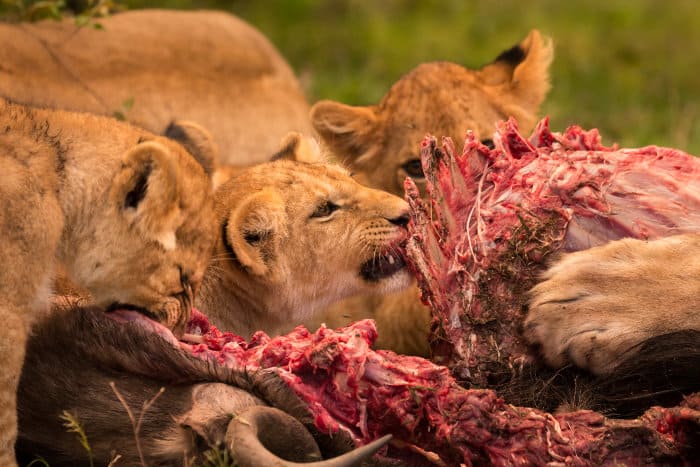
What do lions eat in one day? Usually nothing. Yep, the average lion doesn’t eat a meal every single day. In fact, some lions only eat every four to five days.
It’s generally believed that lions can eat up to 15% of their body mass in a single sitting. Considering big male lions weigh up to 200 kg (440 lbs), that’s a whopping 30 kg (66 lbs) of meat and flesh in just one meal!
Lionesses are considerably lighter at up to 130 kg, so they can eat around 20 kg in one go.
Healthy lions need to eat around 20% of their body weight each week. However, it’s very difficult to quantify how much they actually eat. They are wild animals.
Sometimes the hunt is successful, and they can gorge on an enormous kill. Sometimes they go hungry, and that’s the cycle of life on the savanna.
Pride of lions adapts to the seasons as well. They will eat and eat when times are good, for example, when the great wildebeest migration passes through their territory.
Like most African animals, lions eat more during the green or rainy season. High grass and thick vegetation make it easier to lay an ambush and hunt.
The green season brings a profusion of newborn antelope, meaning easy meals for less-skilled lions.
It’s much harder in the heart of the dry season, as there are very few places to hide on a dry and barren savanna.
What Do Different Lions Eat?
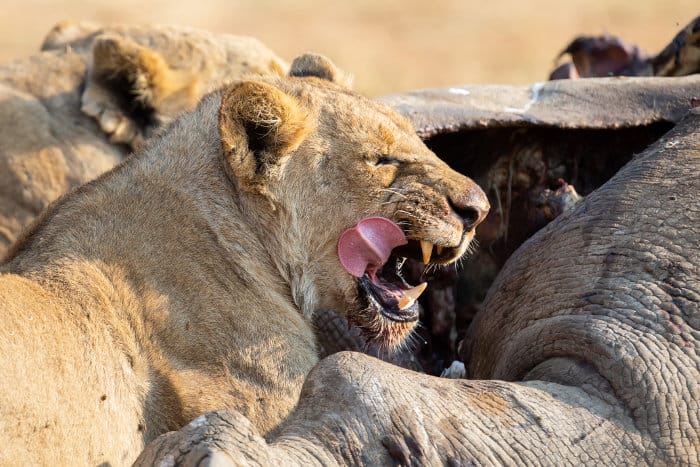
Lions are known as the king of the jungle, but that’s something invented by children’s stories, then perpetuated by Disney and others.
Instead, lions live on savanna, grasslands, around forests, even on rocky hills and shallow mountain slopes. But they don’t live in jungles, and they don’t have kings either.
Instead, lions are experts at adapting to their surroundings. They will eat any prey they can catch.
By growing stronger, they can protect larger territories, which provides access to more food. Different lions have different diets, just like early humans had different diets based on the availability of food in their territories.
Captive lions are hand-fed processed lion meal
How about another question – why are lions held captive? It makes absolutely no sense to hand-feed the world’s apex predator with a controlled diet.
Captive lions are usually fed farmyard animals, typically red meat like beef. Some zoos even supplement meat and flesh with specially formulated lion feed.
A wild lion hunts its own prey and consumes wild, uncooked, and unprocessed flesh. They don’t even add salt and pepper! And captive lions are raised on processed food. Talk about a dramatic contrast in lifestyle.
Lions are majestic predators, magnificent hunters, and very dangerous animals to keep. So let’s stop putting lions in cages and pens and let them do what they are best at – ruling the wild savanna.
What different animals do wild lions eat?
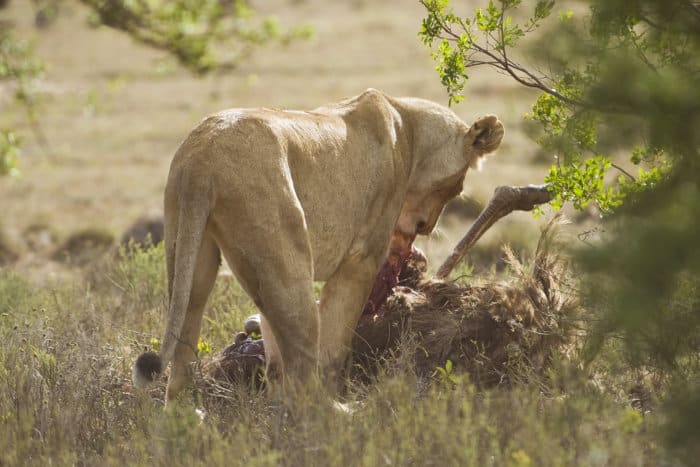
Africa’s wild lions adapt to their surroundings and their ability to hunt.
They have a competitive advantage because they hunt in a pride. So they can take down a large meal as a team. However, a pride has a lot of stomachs to satisfy, so they need to eat regularly.
Studies have also shown that almost half of lion kills are made by a single animal. That figure will include the food of lonely old male lions, as well as lions who live in a pride but stumble upon a rare meal.
Tiny little animal meals
Imagine a lion hunt, and it probably doesn’t involve a mouse. But lions really do eat all meat and flesh.
They pounce on mice and other rodents, feed on flightless birds like the common ostrich, and are quite partial to eating small crocodiles.
Zebra
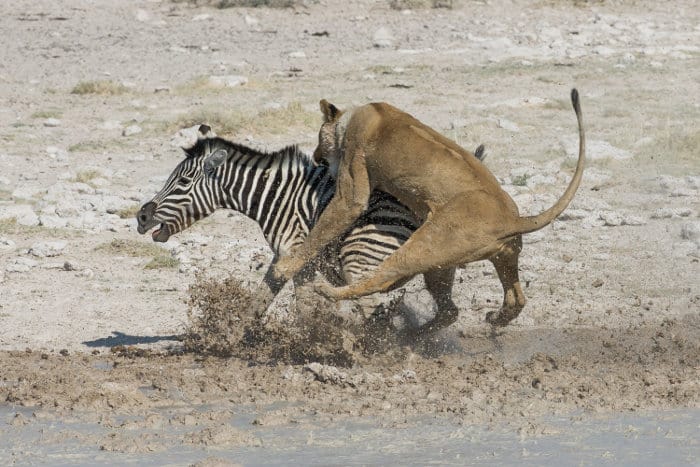
Zebra is a favorite prey of many lions, and it’s believed that zebra stripes evolved as a means of preventing lion attacks after dark. Weighing 200-400 kg, a zebra is a hearty meal for an entire pride.
Warthog
Animals that weigh less than 200 kg may be too small for a large lion pride. But they’re still tasty. Swaziland’s lions are famous for eating warthogs.
In fact, most African lions like to chomp on an African warthog. While they may seem small, they’re relatively easy to catch.
Large antelope
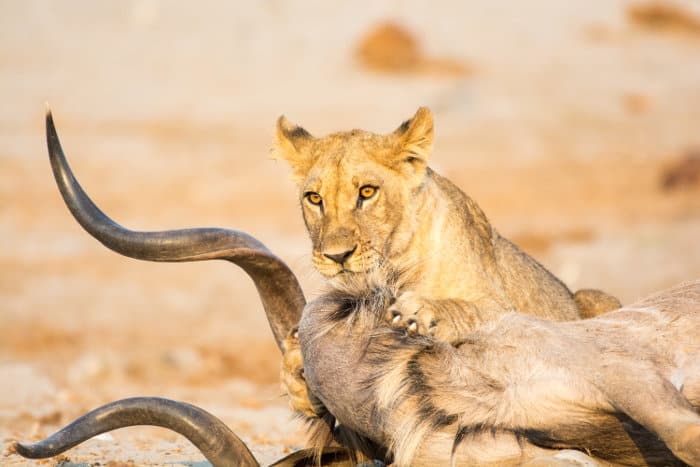
Light and agile antelope is not a great meal, so animals like gazelle and springbok rarely feature on a dinner menu.
Although lions can run fast, they can only maintain these speeds for short distances, so they struggle to keep pace with long-distance runners such as springbok. And it’s not worth the effort for a little bit of meat.
Instead, lions prefer to prey on larger antelope, including all of Africa’s largest antelope species, like kudu and hartebeest.
Cape buffalo
The Cape buffalo is a great example of larger lion prey. Big male buffaloes are too big and dangerous to attack, even for a healthy lioness team.
But lions will isolate the sick, weak or young, for a hearty meal. Cape buffalo will defend themselves ferociously instead of running away.
Young buffalo will be tucked inside a barrier of fur and horns. Then the big males will charge the lions to ward them off a hunt.
Large prey
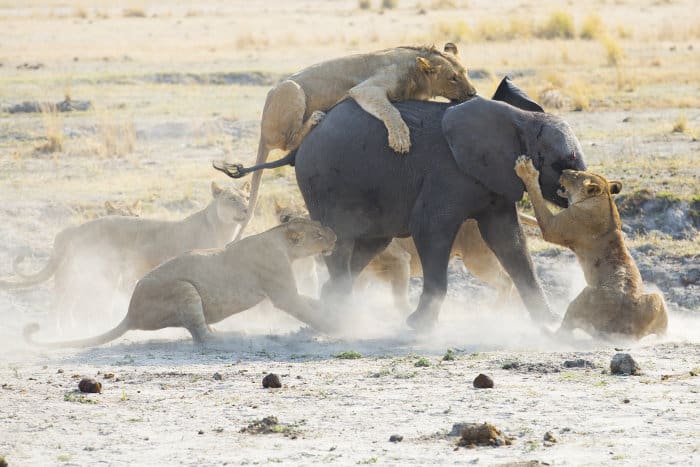
If it’s meaty and fleshy then it’s a potential meal – that’s the starting point for most lion prides. The next important question – how easy is it to catch?
Large lion prides have been recorded attacking baby giraffes.
They were known to hunt young rhinos too; however, that’s very unlikely today, given the drastic drop in rhino numbers. Rhinos once covered Africa in their millions, so a young rhino will have been a regular lion meal.
The BBC even filmed the unthinkable – lions successfully hunting an elephant, the largest land mammal of them all.
Other predators
Don’t think that lions only take down vegetarians. Carnivores eat each other as well!
It would seem a little dangerous for a lion to attack a leopard, but a leopard cub is a different story. A cub will later compete for a lion’s food source, so it’s a tasty snack and chance to protect their own cubs’ future.
Small predators like jackals, African wildcats, and bat-eared foxes are also on the menu, especially for young male lions forced out from their pride.
Scavenging food
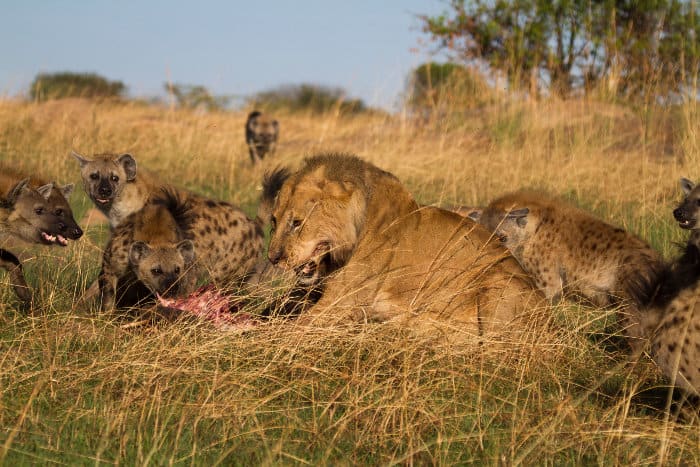
It’s simplistic to think of hyenas as scavengers and lions purely hunters. Both these incredible animals do a lot of both.
Lions may scavenge 10-50% of their food, depending on what’s available in their territory. They most typically scavenge to feed on the meat and flesh of a diseased animal.
Every mammal has to die, even if it can spend an entire lifetime avoiding predators.
Once a mammal dies on the savanna it becomes food for dozens of carnivores and omnivores. African vultures swoop down, caracals steal a bite, and then they all must depart when the lions arrived.
A less celebrated advantage to being an apex predator is having the first choice over any savanna scavenging.
Small predators will need to wait for their turn if lions are busy devouring a carcass. So they must be crafty by taking away as much as possible before lions sniff the kill.
Amazingly enough, lions also lose a lot of their kill to scavengers. After consuming 30 kg of raw meat and flesh, lions do the only thing that it’s possible to do – sleep. So stealthy scavengers can finish their scraps.
Lion prides will also abandon what’s left of a meal to avoid confrontation with hyenas. Nobody likes being woken by hyenas while sleeping off a 30 kg zebra steak! Instead of guarding the meat, they will simply abandon it.
What do baby lions eat?
Baby lions do not eat meat. Cubs will nurse on their mother’s milk for about half a year.
They are completely dependent on milk for the first three months of their life. Meat is introduced into their diets from three months onward, the same time a cub receives its first hunting lesson.
It will take two years for a lion to become proficient at hunting prey and four years before they have really mastered the art.
When prey is abundant, lionesses try to select very weak and old prey. This is easier to catch, so a mother can gently teach her cubs and involve them in a hunt.
After a few lessons, cubs will happily hunt their own small or weak prey without support.
Witnessing an encounter between a lion cub and a warthog is astonishing, as the lion makes mistakes, and the warthog may think attacking is the best form of defense!
What do white lions eat?
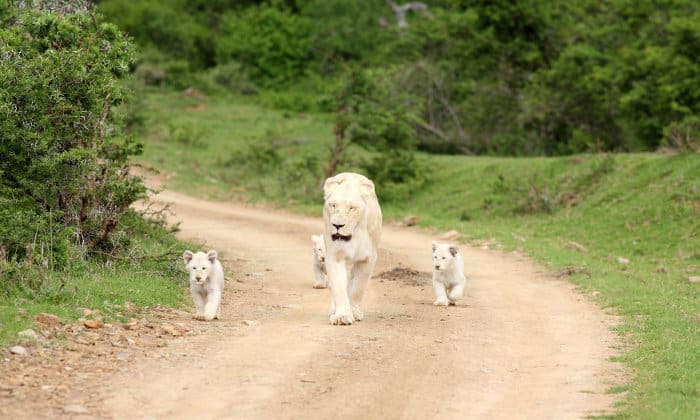
White lions are endemic to the Timbavati region of South Africa, a part of the Greater Kruger National Park area. It’s believed that only ten of these lions are left in the wild.
Unfortunately, white lions have been rampantly hunted, poached, and stolen for zoos. Now there are less than 300 of them in the world.
So most white lions are hand-fed, like all the other captive lions. However, white lions are also apex predators.
Some say that white lions can’t hunt and survive in the wild because they don’t have effective camouflage. That’s simply untrue. White lions can hunt and eat like other African lions if they are protected and given a chance to thrive in the wild.
What do African lions eat in different areas?
If you are wondering if lions eat differently depending on where they live, the answer is yes.
As you’ve read, lions will eat any prey, so their exact diet depends on the animals they live alongside.
Below will answer your questions of “what do lions eat in the savanna?” and “what do lions eat in Botswana?”.
- Lions in the savanna of the Serengeti National Park and Masai Mara predominantly hunt zebra rather than wildebeest that form part of the great wildebeest migration.
- Lions in the Okavango Delta of Botswana have famous and ongoing battles with resident buffalo herds. Cape buffalo are also the primary prey for lions in most of Zimbabwe.
- Kruger National Park’s lions have incredibly broad monthly diets, including zebra, giraffe, ostrich, blue wildebeest, and small crocodiles.
- Lions in Namibia cannot afford to be picky as prey is extremely widespread – so they also eat everything from small reptiles and mice to giraffes and sometimes hippos.
- In Tanzania’s Ruaha National Park the lions are increasingly going for bigger game, including elephants. Ruaha’s elephants weigh up to 8000 kg, so it’s a mighty meal for the lions of the Ruaha landscape.
- Impala make up a large proportion of the diet for Swaziland’s and Zambia’s lions.
Does a Lion Want to Eat You?
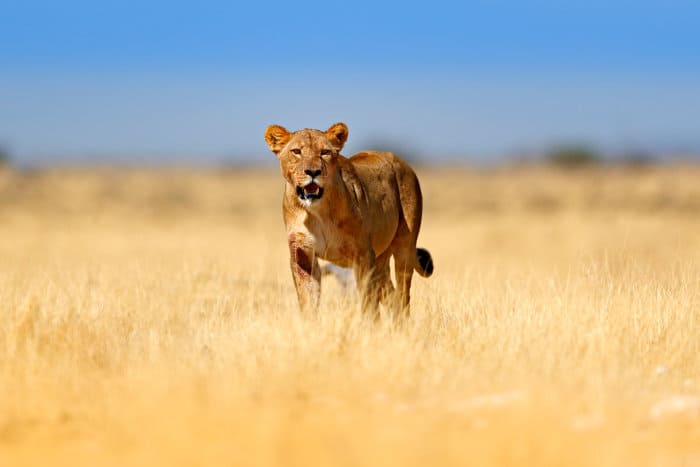
Man-eating lions are not uncommon. There is a famous story of the Tsavo lions in Kenya, who killed and ate 35 construction workers back in 1899.
But lions and people have coexisted all across Africa for many millennia. Early humans lived alongside lions and many different tribes still share the savanna with these big and dangerous cats.
However, a lion wants to eat meat. And you are meat. So yes, a lion will eat you, but only if you’re stupid enough to get too close.
In 2015 an American woman was mauled and killed by a lion in Gauteng, South Africa. As unfortunate as this incident was, the woman was taking photos of nearby lions from the open window of a low vehicle.
No lion is going to pass on such an easy meal.
What Does a Lion Eat?
So there you have it, lions are carnivores that receive all the nutrients that they need from the meat and flesh of other animals.
A lion’s favorite meal will vary depending on which African region they are found in and the abundance of other animals in the area.
You’ll rarely see them munching on grass or vegetation. They’ll only resort to this if they haven’t eaten in a very long time with little prospects of catching fresh meat in the near future.
To see these stunning animals in their natural habitat, check out some incredible African safari deals.
